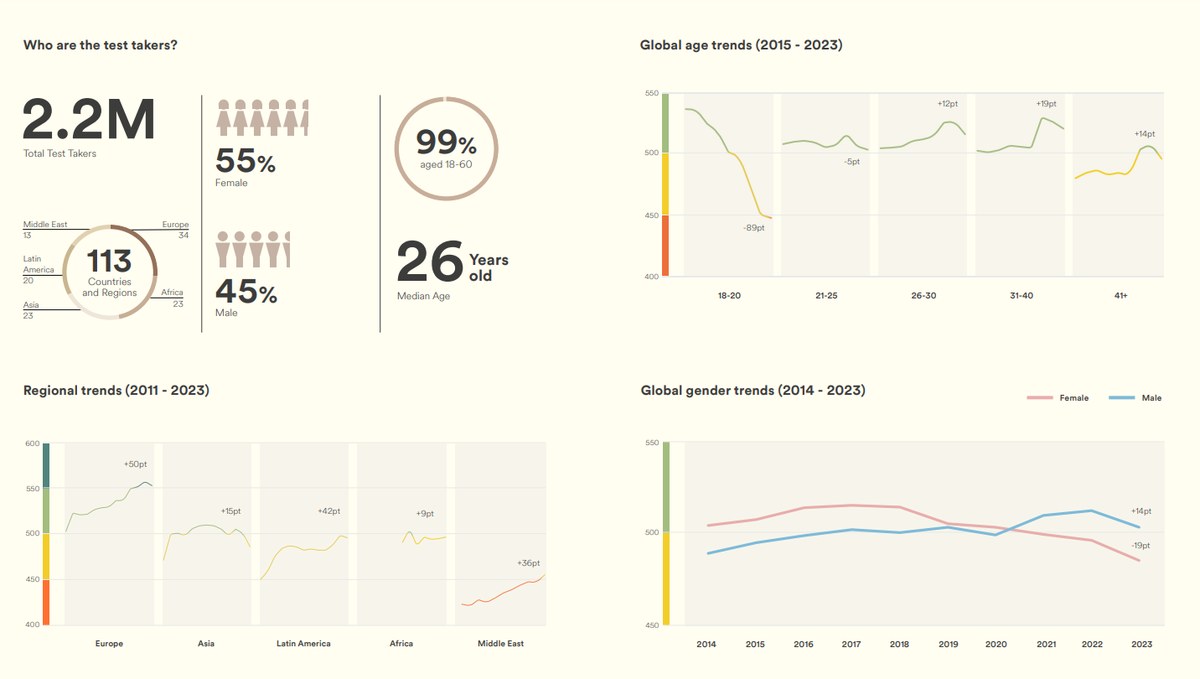The EF English Proficiency Index rating indicates that Ukraine has a moderate level of proficiency in the English language. The country received an average score of 530 and secured the 45th position out of 113 in the ranking.
The EF EPI 2023 study encompasses 113 countries and is based on the results of 2.2 million standardized English language tests conducted by EF Education First in 2022.
Leading the ranking, as in the previous year, are the Netherlands with an average score of 647 out of 800 possible points, followed by Singapore (631) and Austria (616). Denmark (615) and Norway (614) have swapped positions, now ranking fourth and fifth, respectively.
Ukraine occupies the 45th position in the ranking, indicating a moderate level of English proficiency.
It is worth noting that all countries with very high language proficiency and many countries with high language proficiency received lower average scores than in the previous year, reflecting the potential impact of the Covid-19 pandemic on education, travel, and personal communication.

The primary markets for English language instruction with a professional focus, such as Italy (-13), France (-10), Spain (-10), and Brazil (-18), remained in the group of countries with a moderate level of language proficiency. All of them demonstrated a double-digit decline compared to the previous year. Meanwhile, Japan (-18) and China (-34) remained in the group of countries with a low level of language proficiency.
Among cities, Amsterdam remained the most proficient with an average score of 646, followed by Vienna, which climbed from the seventh position in the previous year to 640. The top five leaders also include Copenhagen (639), Stockholm (637), and Oslo (629).
The capital of Ukraine, Kyiv, secured the 43rd position with a score of 547. Kyiv slightly outperformed Minsk, Montevideo, and San Jose but lagged behind Beirut, Havana, Brasilia, and Moscow.
Age groups: Over the past eight years, the average score of 18-20-year-old test participants decreased by 89 points, while in most older age groups, it increased, particularly in the age groups 31-40 (+19 points) and 41+ (+14 points).
The authors note that the decline in results in the 18-20 age group was moderate or stable in most countries and only pronounced in a few major countries.
Gender gap in language proficiency: Over the last nine years, the English language proficiency level among men has improved by 14 points, while among women, it decreased by 19 points, altering the trend toward higher English language proficiency among women in the first five years of the EPI analysis.

EF indicates that while most countries do not have a significant gender gap, out of those that do, 38 countries favor men, and only five favor women. The authors suggest that one of the reasons is the insufficient representation of women in high-paying international jobs, but they add that the gender gap among individuals aged 18-25 indicates a 'problem stemming from educational systems themselves or social issues that schools cannot address.'
Over the past nine years, the decline in scores for women was particularly noticeable in Asia (-30 points), compared to a 10-point increase for men. In Europe, scores for both men and women increased, although men's scores were higher (+46) compared to women's (+19).
An exception was the Middle East, where women's average scores increased by 44 points, surpassing men, whose scores increased by 29 points over the same period.
Among various professions, aviation workers demonstrated the highest proficiency levels; media, sports and entertainment, and professional services also fell into the high English proficiency category. Regarding job levels, the highest average scores were achieved by IT professionals, accountants, strategy and planning professionals, followed by marketing and human resources management personnel.
EF notes that over the years, the gap between proficiency levels among different job hierarchies has become more homogeneous, and in Europe and Africa, staff members have a higher level of qualification than managers and executives.





















